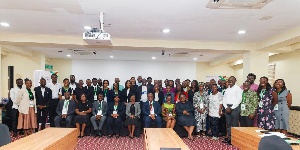- Home - News
- Elections 2024
- News Archive
- Crime & Punishment
- Politics
- Regional
- Editorial
- Health
- Ghanaians Abroad
- Tabloid
- Africa
- Religion
- Photo Archives
- Press Release
General News of Wednesday, 30 April 2025
Source: www.ghanawebbers.com
Judiciary contributes to National AI Strategy at key consultation forum
Stakeholders from Ghana’s judiciary met at the AH Hotel in East Legon. This was for the third National AI Strategy Consultation. The meeting is crucial for finalising Ghana’s AI development blueprint.
The event highlighted the need for an ethical and inclusive AI framework. This framework aims to drive innovation while protecting national interests.
Johnson Masagotin Singir, a Science and Innovation Officer at the British High Commission, spoke about AI's global impact. He said it “transforms how we live and work.”
He noted that AI could revolutionise agriculture, health, education, and public services. In particular, he mentioned its potential in the justice system.
“Imagine judges and lawyers using AI to analyse legal documents quickly,” he said. He reaffirmed the UK’s commitment to supporting Ghana’s AI journey. He stressed that AI must be open, responsible, secure, and resilient.
Mr. Elikplim Sabblah from GIZ Ghana discussed efforts to strengthen Ghana’s digital ecosystem. His initiative supports AI policy development across Africa and Asia.
He highlighted the judiciary's role in addressing ethics and legal risks related to AI. “Engaging legal experts ensures compliance with data protection laws,” he stated.
Dickson Tweneboa-Koduah from the Ghana Bar Association called the strategy a bold step. He emphasized that Ghana should shape its technological future rather than be shaped by it.
While acknowledging benefits of AI, he warned of risks like bias and misinformation. “AI must not roll out unregulated,” he asserted, calling for constitutional fidelity and democratic oversight.
Dr. Arnold Karvaapuo represented Hon. Samuel Nartey George at the event. He reiterated that AI could reduce case backlogs and improve judicial efficiency.
“Your expertise is vital in shaping tools that reflect Ghana’s values,” he told stakeholders.
Mr. Darlington Akogo from MinoHealth AI Labs presented on making AI a top focus area for Ghana. He explained what AI is and its economic potential.
He estimated a $20 billion boost to GDP by 2030 through AI development. Akogo called for an urgent establishment of an AI National Fund between $500 million to $1 billion.
Prof. Jerry John Kponyo from RAIL confirmed that Ghana's strategy is on track for approval by June 2025. He urged continued collaboration among stakeholders to create a people-centred strategy.
During discussions, participants raised important points:
- Human oversight is needed for high-risk AI decisions.
- Shortening the strategy timeframe from 10 years to 5 years.
- Establishing a Ghana AI Institute instead of just a Responsible AI Office.
- Developing a national data strategy alongside existing policies.
- Addressing infrastructure gaps like energy and internet access.
- Prioritising education, gender inclusion (women & children), and regional collaboration.
The consultation underscored the judiciary's role in creating an ethical future for AI in Ghana. With strong legal safeguards and infrastructure investments, this strategy aims for inclusive growth and global competitiveness.
Feedback on the draft strategy remains open as Ghana approaches finalisation of its landmark policy on artificial intelligence.











